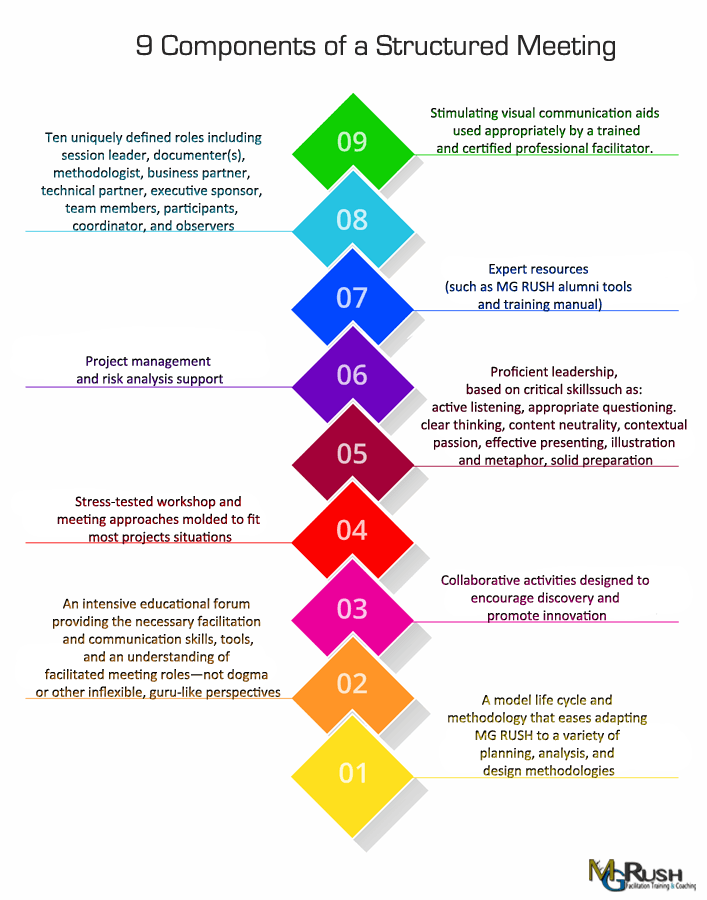A facilitated structured meeting or workshop provides an environment designed to extract high-quality information in a compressed timeframe. A structured meeting uses visual aids and a team of experts to accelerate projects and increase the quality of decisions, outputs, deliverables, and outcomes.
Therefore, the major components of the MGRUSH structured meeting technique include:
- A model life cycle and methodology that eases adapting MGRUSH to a variety of planning, analysis, and design methodologies
- An intensive educational forum providing the necessary facilitation and communication skills, tools, and an understanding of facilitated meeting roles—not dogma or other inflexible, guru-like perspectives
- Collaborative activities designed to encourage discovery and promote innovation
- Stress-tested workshop and meeting approaches molded to fit most project situations
- Proficient leadership, based on critical skills such as:
-
- active listening
- appropriate questioning
- clear thinking
- content neutrality
- contextual passion
- effective presenting
- illustration and metaphor
- solid preparation
- Project management and risk analysis support
- Expert resources (such as MGRUSH alumni tools and the Professional Reference Manual)
- Ten uniquely defined roles including session leader, documenter(s), meeting designer, business partner, technical partner, executive sponsor, team members, participants, coordinator, and observers
- Stimulating visual communication aids, used appropriately by a trained and certified professional facilitator.
A Structured Meeting is NOT
A structured meeting or workshop is NOT a replacement for analytical methodologies. A structured meeting or workshop works with methodologies to generate a uniform voice by providing an efficient two-way flow of information, from one person or group to another. Consequently, information developed with a consensual method provides value by becoming the foundation for additional information gathering, development, and decisions.
Session Leader
A neutral session leader (i.e., facilitator/ methodologist) provides the keystone for structured workshops. The session leader understands the preparation requirements, group dynamics, and appropriate methodology. Therefore, the session leader is responsible for managing the approach—the agenda, the ground rules, the flow of the conversation, etc.—but not the content of the discussion, or even necessarily the project(s) being supported by the discussion and decisions.
Effective Facilitator
Various academic research has found that the most effective type of facilitator was one that actively elicited questions and responses from the quietest participants to enable a balance among the players. Consequently, effectiveness is best achieved by building a safe and trustworthy environment, one that provides “permission to speak freely,” without fear of reprisal or economic loss.
Defined Products
Finally, the type of documentation generated drives workshop techniques. Some use templates to organize the notes taken during a workshop. The information collected starts out as raw or draft notes. Draft notes provide formal input to the project process. However, the meeting or workshop is not synonymous with the project, rather it compliments additional tasks and activities performed before and after the meeting or workshop, typically by the project team. A clear and consensually agreed upon path of next steps and “WHO does WHAT by WHEN” becomes the most common deliverable of meetings and workshops.
______
Don’t ruin your career by hosting bad meetings. Sign up for a workshop or send this to someone who should. MGRUSH workshops focus on meeting design and practice. Each person practices tools, methods, and activities every day during the week. Therefore, while some call this immersion, we call it the road to building high-value facilitation skills.
Our workshops also provide a superb way to earn up to 40 SEUs from the Scrum Alliance, 40 CDUs from IIBA, 40 Continuous Learning Points (CLPs) based on Federal Acquisition Certification Continuous Professional Learning Requirements using Training and Education activities, 40 Professional Development Units (PDUs) from SAVE International, as well as 4.0 CEUs for other professions. (See workshop and Reference Manual descriptions for details.)
Want a free 10-minute break timer? Sign up for our once-monthly newsletter HERE and receive a timer along with four other of our favorite facilitation tools, free.

Terrence Metz, president of MG RUSH Facilitation Training, was just 22-years-old and working as a Sales Engineer at Honeywell when he recognized a widespread problem—most meetings were ineffective and poorly led, wasting both time and company resources. However, he also observed meetings that worked. What set them apart? A well-prepared leader who structured the session to ensure participants contributed meaningfully and achieved clear outcomes.
Throughout his career, Metz, who earned an MBA from Kellogg (Northwestern University) experienced and also trained in various facilitation techniques. In 2004, he purchased MG RUSH where he shifted his focus toward improving established meeting designs and building a curriculum that would teach others how to lead, facilitate, and structure meetings that drive results. His expertise in training world-class facilitators led to the 2020 publication of Meetings That Get Results: A Guide to Building Better Meetings, a comprehensive resource on effectively building consensus.
Grounded in the principle that “nobody is smarter than everybody,” the book details the why, what, and how of building consensus when making decisions, planning, and solving problems. Along with a Participant’s Guide and supplemental workshops, it supports learning from foundational awareness to professional certification.
Metz’s first book, Change or Die: A Business Process Improvement Manual, tackled the challenges of process optimization. His upcoming book, Catalyst: Facilitating Innovation, focuses on meetings and workshops that don’t simply end when time runs out but conclude with actionable next steps and clear assignments—ensuring progress beyond discussions and ideas.




Reblogged this on Gr8fullsoul.